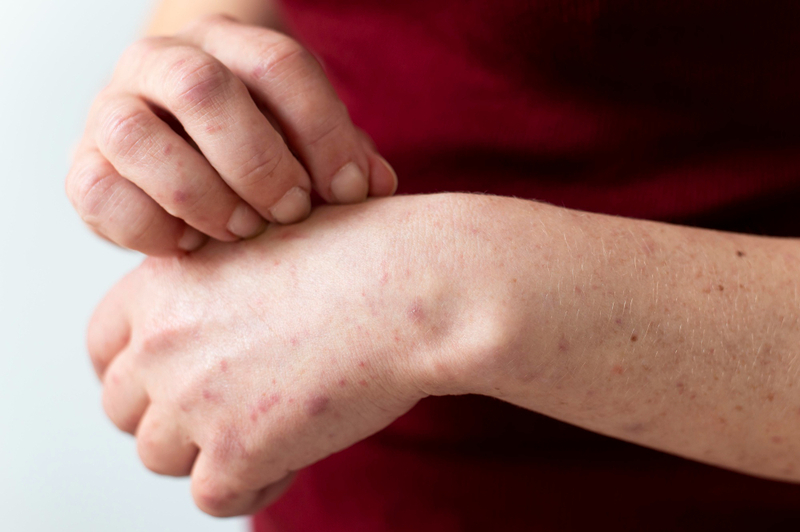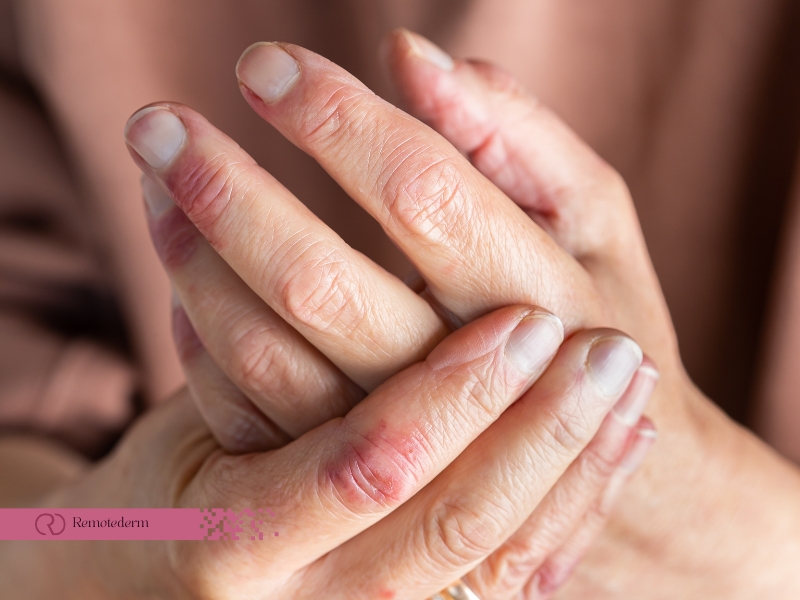Hand eczema is a common skin problem that many people suffer from. This skin condition needs to be managed properly and can be caused by environmental factors, allergens, or genetics. In this article, we’ll look at the effective treatments for eczema on hands, giving practical advice to help you get rid of eczema and keep it under control.
What is Hand Eczema?
Hand eczema or hand dermatitis is an inflammatory chronic skin condition that is very common, and it causes the hands to be red, itchy, and sometimes to form painful blisters. It usually happens to people who wash their hands frequently and are in contact with irritating substances like soaps, detergents, or chemicals. This skin condition can be directed by allergies or genetic factors as well.
The typically seen manifestations of hand eczema are:
- Red, inflamed skin
- Itching or burning sensations
- Dry, scaly patches
- Cracked or peeling skin
- Blisters that may ooze and form crusts
Causes of Hand Eczema
Several factors contribute to the development of hand eczema, including:
- Irritants: Soaps, detergents, or chemicals, prolonged exposure to which can inflict eczema.
- Allergens: Contact with allergens, such as latex, fragrances, or nickel, may cause an allergic reaction, which further triggers eczema.
- Genetics: Family history of eczema and/or other atopic conditions such as asthma and hay fever can increase the chances of developing eczema on the hands.
- Environmental factors: Cold, dry weather or frequent hand washing in cold climates like Canada can exacerbate eczema symptoms, respectively.
- Stress: Emotional stress causes a worsening effect on existing eczema or even the emergence of new ones.

How to Treat Eczema on Hands
Hand eczema management is a complex issue that requires a well-planned treatment plan that includes changes in one’s lifestyle as well as medical treatment. Here are several strategies for treating hand eczema.
1. Moisturize Regularly
When you have hand eczema, you can use odor-free, thick moisturizing creams or ceramide creams that contain not only petroleum jelly but also other substances specially designed for eczema. Consider wearing cotton gloves overnight to ensure that your skin stays moisturized, and apply last after washing your hands and before going to bed.
2. Avoid Irritants
To keep your hands healthy and to avoid dermatitis, you should wear gloves if you are cleaning or using chemicals. Moreover, switch to mild, fragrance-free soaps and detergents, and do not wash your hands too often, as that will strip the natural oils from your skin and make it prone to dryness.
3. Use Topical Steroids
Topical corticosteroids are a prescription-strength anti-inflammatory and anti-itch medication that can be very useful in the treatment of eczema. Adequate application methods and respecting doctor’s prescription are important to prevent the long term use related side effects.
4. Seek Prescription Treatment
In the case of severe eczema, instead of long waits for appointments, you can visit an online eczema dermatologist who can prescribe you medications such as oral corticosteroids or immunosuppressants after a consultation. Phototherapy is also a choice for chronic hand eczema treatment.
5. Control Stress Levels
Engage in stress management practices like mindfulness, yoga, or deep-breathing exercises to avoid stress-related flare-ups.
How to Get Rid of Eczema on Hands
In today’s time, hand eczema does not seem to have a permanent solution, however, you can always manage it by not only using the prescribed treatments but also by lifestyle changes. Here are additional tips to get rid of eczema on hands:
- Stay Hydrated: Water helps to hydrate your skin from the inside out, which is why you should drink plenty of water, especially in the summer.
- Apply Emollients: Regular application of emollient creams will help to reinforce the skin’s natural defense.
- Limit Exposure to Water: As for the washing of hands, always use lukewarm water, and you want to pat dry your hands instead of rubbing to avoid irritation.
- Protect Your Skin: Wearing gloves is protective for you and also to the people you are cleaning or handling potential allergens, and of course, it is advised to choose gloves lined with cotton to reduce sweating.

Home Remedies for Hand Eczema
Besides the medical treatment, the home facilities can help to relieve eczema on the hands. Below are some remedies you can consider:
- Oatmeal baths are good at treating itching and inflammatory reactions.
- Use virgin coconut oil as a natural moisturizer to make your skin smooth.
- Aloe vera is one of the natural remedies that you can use to control hand eczema.
- Humidifiers can also be used to keep your airways clear from dry air which increases flare-ups of eczema when exposed to environmental conditions such as dry windy weather.
Final Thoughts
Dealing with hand eczema is not easy, however, with good care and treatment you will be able to control the flare-ups and maintain the health of your hands. The use of moisturizers, avoidance of irritants, or consulting a dermatologist in Canada are the ways that you can use to get relief from this chronic skin condition. Always stick to the treatment plan and if symptoms get worse, see a health specialist.
FAQs
Can hand eczema Extend to other body parts? No, the hand eczema does not move to other areas from one part. However, the various areas of your skin can be affected by eczema on their own.
Are there some foods that provoke hand eczema? Dairy, nuts, and gluten can be the ones that start eczema for some people. Finding and quitting these foods may be a useful way to reduce the symptoms.
Is hand eczema a contagious disease? No, hand eczema is not contagious and cannot be passed on to others.
Can hand eczema disappear without treatment? In the case of hand eczema, proper skin care can improve mild cases but most cases need long-term management for keeping symptoms under control.
